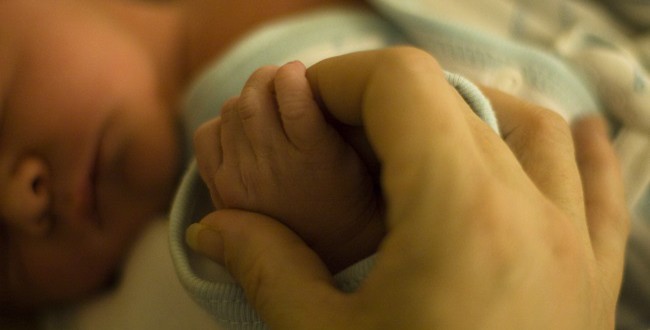Over a decade ago, a bone marrow transplant left a Belgian girl infertile. Now, a transplant of her own frozen ovarian tissue has helped her get pregnant and give birth to a healthy baby boy.
The young mother, who has not been named to protect her identity, underwent the life-saving surgery to remove her right ovary when she was just 13 having been diagnosed with sickle-cell anaemia which required chemotherapy.
She was born in the Democratic Republic of Congo but had moved to Belgium by the age of 11, where she underwent the operation.
A decade later, doctors began to examine ways of restoring the woman’s fertility after the patient told counsellors she wished to become a mother.
Medics led by Dr Isabelle Demeestere, a gynaecologist at Erasme Hospital in Brussels, stopped the patient’s hormone replacement therapy, thawed some of the frozen ovarian tissue and grafted four fragments on to the remaining left ovary, and 11 other fragments at other sites in the body.
The transplanted tissue started to respond to her hormones and successfully grew follicles that contained the maturing eggs. The patient started menstruating within five months.
However, the patient only became pregnant two years later – at the age of 27 – after she discovered her previous boyfriend was infertile and started a new relationship.
She delivered a healthy boy in November 2014, weighing just under 7lbs (3.1kg).
The details have been released today in the Human Reproduction journal.
Dr Demeestere said: “This is an important breakthrough in the field because children are the patients who are most likely to benefit from the procedure in the future. When they are diagnosed with diseases that require treatment that can destroy ovarian function, freezing ovarian tissue is the only available option for preserving their fertility.
“However, the success of this procedure requires further investigation in very young, pre-pubertal girls, as our patient had already started puberty even though she had not started menstruating. In addition, the procedure also raises some controversial issues.”
The patient’s ovary continues to function normally and her doctors say there is no reason why she could not have more babies if she wants to.
Professor Simon Fishel, president of the CARE fertility group, said: “This case is important and highlights a future direction of human reproductive technologies.
“It is not the first success using cryo-preserved ovarian tissue, but it is the first of its kind in relation to the case history.
“It further supports the need for the acceptance and wider development of ovarian tissue frozen storage and potential use in the future – either for fertility preservation or, indeed, a potential replacement of medication used post-menopausally.”
Professor Adam Balen, from the Leeds Centre for Reproductive Medicine, said: “Chemotherapy can affect the ovaries and lead to an early menopause, which was the case here.
“Chemotherapy is also used to treat certain cancers and so the option of freezing ovarian tissue gives the opportunity to preserve fertility for later. This procedure has been carried out many times now in adults and several pregnancies have been reported worldwide.
“There had previously been uncertainty as to whether ovarian tissue taken from young girls would later on be competent to produce mature, fertile eggs, so today’s case is both reassuring and exciting.
“We have to remember that many children who require chemotherapy are very ill and the surgery to remove ovarian tissue is no small undertaking. Furthermore there are only a few centres where the technology is available and this sort of treatment achievable. In years to come it will no doubt become more routine.”
Agencies/Canadajournal
 Canada Journal – News of the World Articles and videos to bring you the biggest Canadian news stories from across the country every day
Canada Journal – News of the World Articles and videos to bring you the biggest Canadian news stories from across the country every day



